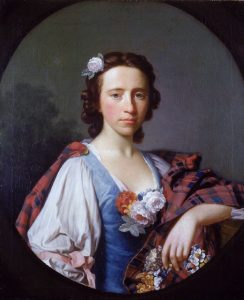During Women’s History Month, we’re taking a look at some of the most memorable female figures in Scottish history. Read on to learn about Flora MacDonald, who famously formulated the Bonnie Prince Charlie’s escape from Scotland after the Battle of Culloden in 1746.

This month, we celebrate women of renown — historical, contemporary, and those with whom
we share personal connections. The month of March also offers us an opportunity to celebrate a
Scottish woman of profound historical significance who can also be credited with blazing a trail
for future members of the diaspora in North America, and how we identify as such. On March
5th, 1790, Flora MacDonald, Bonnie Prince Charlie’s voluntary personal smuggler, died and
was buried on Skye. She is remembered as the unlikeliest of escape artists, a young woman
having successfully disguised Charles Edward Stuart as Betty Burke and transported him “over the sea to Skye” after his legendary defeat at Culloden.
It isn’t often that we read of seemingly unremarkable young women or men attempting to smuggle highly targeted fallen princes away from the clutches of their dangerous foes — in this case, the British government. Amazingly, it is not this act of bravery and rebellion that makes her a heroine, nor does it best illustrate her “Scottishness.”
Her perilous feat earned her less than desirable accommodations in the Tower of London, but it also earned her the admiration of the inhabitants of the British Isles, Jacobites and Hanoverians alike. While in London she famously said to her most absurd admirer and visitor, the Prince of Wales, that had he been in as desperate a situation as the defeated Bonnie Prince, she would have done the same for him. Contrary to romantic interpretations of Flora’s story, she did not act out of reckless rebellion for the Jacobite cause, but as a woman overcome with compassion for someone in need.
In 1774, Flora and her husband left Scotland and settled in North Carolina, which was booming with Scottish immigrants in the 18th century, and continues to be a gathering place for Scottish-Americans today as the home of the acclaimed Grandfather Mountain Highland Games. It is clear that she left her mark in America, but not as a Scottish rebel. Shockingly, perhaps, her family worked in support of the English forces during the American Revolution, sometimes against fellow Scots and in league with the very regime that held Flora hostage in the tower years before. It’s possible that Flora wanted to be on, what she supposed, would be the winning side this time around. But following the numerous and tragic losses of Culloden, perhaps what she truly sought was peace and quiet.
Later, she fled to Canada seeking refuge from revolutionaries, thus playing her part in the
evolution of the diaspora even more extensively. While she did claim Scotland as her final
resting place, along the way she planted her footsteps in North American soil which Scots would trace for centuries to come.
Flora’s lesson in Scottish bravery isn’t a Highland charge on a misty morning in April, but in putting oneself in the line of fire to help the needy, friend or foe. The tale of Flora MacDonald teaches us what 18th century Highland women and men valued. If she was on a side, it was that of comfort and tradition. Flora MacDonald’s Scottishness is not in her act of rebellion, but in her act of compassion and her steadfast longing for a sense of home. This, all those who are drawn to their ancestral home can grasp; and in this Flora MacDonald becomes all of us — courageous, comforting, holding our traditions as prized possessions, and yearning for Scotland, for home.
Links and Further Reading
1. The National Archives
A statement from Flora MacDonald detailing her and Charles Stuart’s escape to Skye.
2. Presbyterian Historical Society
3. North Carolina Museum of History
4. “The Skye Boat Song”


